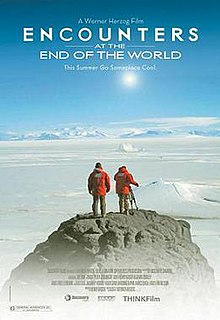
Werner Herzog is a German filmmaker, actor, opera director, and author. Regarded as a pioneer of New German Cinema, his films often feature ambitious protagonists with impossible dreams, people with unusual talents in obscure fields, or individuals in conflict with nature. His style involves avoiding storyboards, emphasizing improvisation, and placing his cast and crew into real situations mirroring those in the film they are working on.

Incident at Loch Ness is a 2004 mockumentary starring, produced by and written by Werner Herzog and Zak Penn, while also serving as the latter's directorial debut. The small cast film follows Herzog and his crew while working on the production of a movie project on the Loch Ness Monster titled Enigma of Loch Ness. Incident at Loch Ness won the New American Cinema Award at the 2004 Seattle International Film Festival.
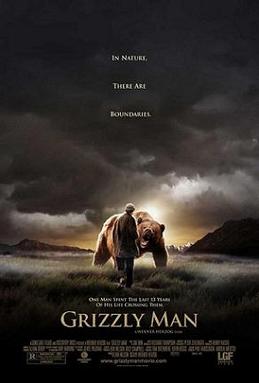
Grizzly Man is a 2005 American documentary film by German director Werner Herzog. It chronicles the life and death of bear enthusiast and conservationist Timothy Treadwell and his girlfriend Amie Huguenard at Katmai National Park, Alaska. The film includes some of Treadwell's own footage of his interactions with brown bears before 2003, and of interviews with people who knew or were involved with Treadwell, in addition to professionals who deal with wild bears.
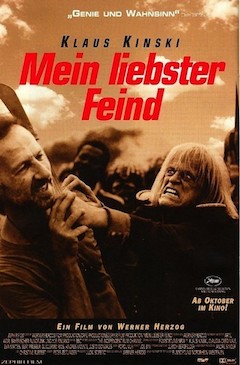
My Best Fiend is a 1999 German documentary film written and directed by Werner Herzog, about his tumultuous yet productive relationship with German actor Klaus Kinski. It was released on DVD in 2000 by Anchor Bay.

The Wild Blue Yonder is a 2005 science fiction fantasy film by German director Werner Herzog. It was presented at the 62nd Venice Film Festival, where it won the FIPRESCI Award. It was screened in competition at the Mar del Plata International Film Festival and the Sitges Film Festival, winning the "Carnet Jove – Special Mention" award at the latter. Most of the film consists of recontextualized documentary footage which is overlaid with fictional narration. This technique was used in Herzog's earlier film Lessons of Darkness (1992).

Little Dieter Needs to Fly is a 1997 German-British-French documentary film written and directed by Werner Herzog, produced by Werner Herzog Filmproduktion, and premiered on German television. The film follows the life of Dieter Dengler, in particular being shot down during the Vietnam War and his capture, imprisonment, escape, and rescue. Herzog went on to direct a dramatized version of the story, Rescue Dawn, which stars Christian Bale as Dengler in 2006.

Burden of Dreams is a 1982 documentary film directed by Les Blank.

In the Shadow of the Moon is a 2007 British documentary film about the United States' crewed missions to the Moon. After premiering at the 2007 Sundance Film Festival, where it won the World Cinema Audience Award, it was given a limited release in the United States on 7 September 2007, and in Canada on 19 October.

Joe Strummer: The Future Is Unwritten is a 2007 documentary film directed by Julien Temple about Joe Strummer, the lead singer of the British punk rock band The Clash, that went on to win the British Independent Film Awards as Best British Documentary 2007. The film premiered 20 January 2007 at the 2007 Sundance Film Festival. It was also shown at the Dublin Film Festival on 24 February 2007.

Bad Lieutenant: Port of Call New Orleans is a 2009 American black comedy crime drama film directed by Werner Herzog and starring Nicolas Cage, Eva Mendes, Tom Bower, Jennifer Coolidge, Alvin 'Xzibit' Joiner, Val Kilmer, and Brad Dourif. Though the film's title and story loosely resemble that of Abel Ferrara's 1992 film Bad Lieutenant, according to Herzog, it is neither a sequel nor a remake; its only commonality is a corrupt policeman as the central character. Nonetheless, the director of the original Bad Lieutenant film, Abel Ferrara, expressed dismay that the Herzog film was being made. Both Bad Lieutenant films were produced by Edward R. Pressman.

Cave of Forgotten Dreams is a 2010 3D documentary film by Werner Herzog about the Chauvet Cave in Southern France, which contains some of the oldest human-painted images yet discovered—some of them were crafted around 32,000 years ago. It consists of footage from inside the cave, as well as of the nearby Pont d'Arc natural bridge, alongside interviews with various scientists and historians. The film premiered on 13 September 2010 at the Toronto International Film Festival.

Into the Abyss is a 2011 documentary film written and directed by Werner Herzog. It is about capital punishment, and focuses on a triple homicide that occurred in Montgomery County, Texas, in 2001. In the film, Herzog interviews the two young men convicted of the crime, Michael Perry and Jason Burkett, as well as family members and acquaintances of the victims and criminals, and individuals who have taken part in executions in Texas. The primary focus of the film is not the details of the case or the question of Michael and Jason's guilt or innocence, and, although Herzog's voice can be heard as he conducts the interviews, there is a minimal amount of narration, and he never appears onscreen, unlike in many of his films.
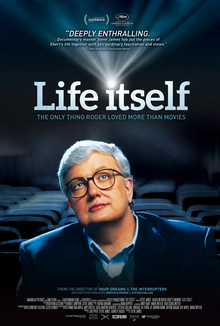
Life Itself is a 2014 American biographical documentary film about Chicago film critic Roger Ebert, directed by Steve James and produced by Zak Piper, James and Garrett Basch. The film is based on Ebert's 2011 memoir of the same name. It premiered at the 2014 Sundance Film Festival and was an official selection at the 67th Cannes Film Festival. The 41st Telluride Film Festival hosted a special screening of the film on August 28, 2014. Magnolia Pictures released the film theatrically in the United States and simultaneously via video on demand platforms on July 4, 2014.

Lo and Behold, Reveries of the Connected World is a 2016 American documentary film directed by Werner Herzog. In it, Herzog ponders the existential impact of the Internet, robotics, artificial intelligence, the Internet of Things, and more on human life. The film premiered at the 2016 Sundance Film Festival, and was sponsored by the company NetScout. The film contains interviews with Bob Kahn, Elon Musk, Sebastian Thrun, Ted Nelson, and other leaders of the technology world.

Salt and Fire is a 2016 thriller film written and directed by Werner Herzog. The film stars Michael Shannon, Veronica Ferres, and Gael García Bernal. It tells the story about a hostage-taking situation set against an ecological disaster in Bolivia. It had its premiere at the Shanghai International Film Festival. It was selected to be screened in the Special Presentations section at the 2016 Toronto International Film Festival.
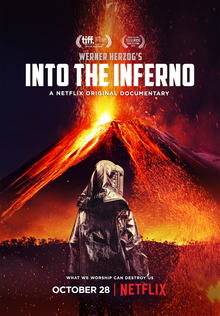
Into the Inferno is a 2016 documentary film directed by Werner Herzog. In it, Herzog explores active volcanoes from around the world, and the people who live near them, with volcanologist Clive Oppenheimer. The film had its world premiere at the Telluride Film Festival on 3 September 2016 before its debut on Netflix on 28 October 2016.

Meeting Gorbachev is a 2018 biographical documentary film directed by Werner Herzog and André Singer about the life of Mikhail Gorbachev, the eighth and last leader of the Soviet Union. The film features three interviews between Herzog and Gorbachev, conducted over the span of six months, and had its world premiere at the Telluride Film Festival on September 1, 2018.

Werner Herzog is a German filmmaker whose films often feature ambitious or deranged protagonists with impossible dreams. Herzog's works span myriad genres and mediums, but he is particularly well known for his documentary films, which he typically narrates.
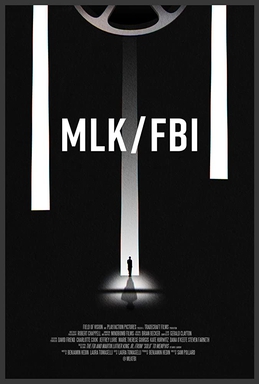
MLK/FBI is a 2020 American documentary film directed by Sam Pollard, from a screenplay by Benjamin Hedin and Laura Tomaselli. It follows Martin Luther King Jr. as he is investigated and harassed by J. Edgar Hoover's Federal Bureau of Investigation.

Fireball: Visitors from Darker Worlds is a 2020 documentary film directed by Werner Herzog and Clive Oppenheimer. The film explores the cultural, spiritual, and scientific impact of meteorites, and the craters they create around the globe.
